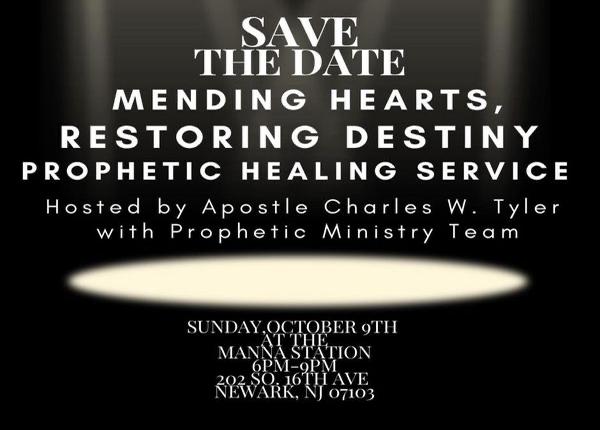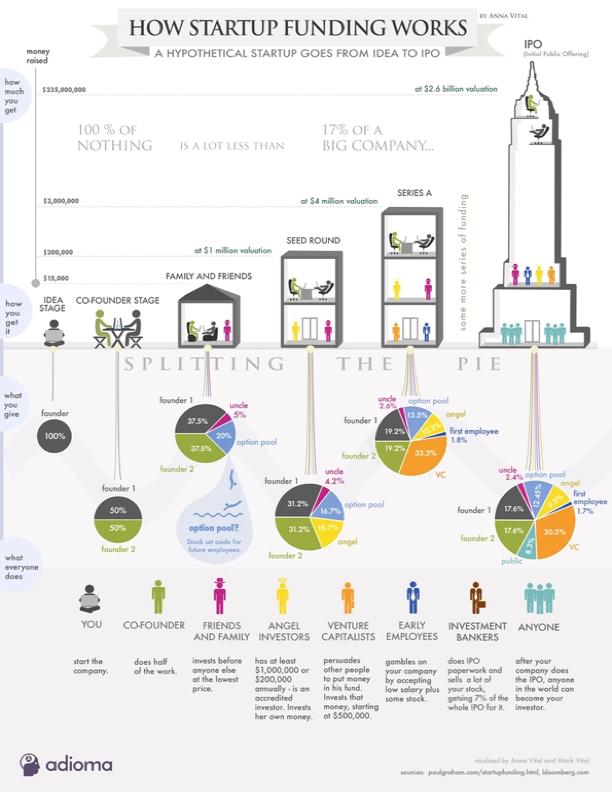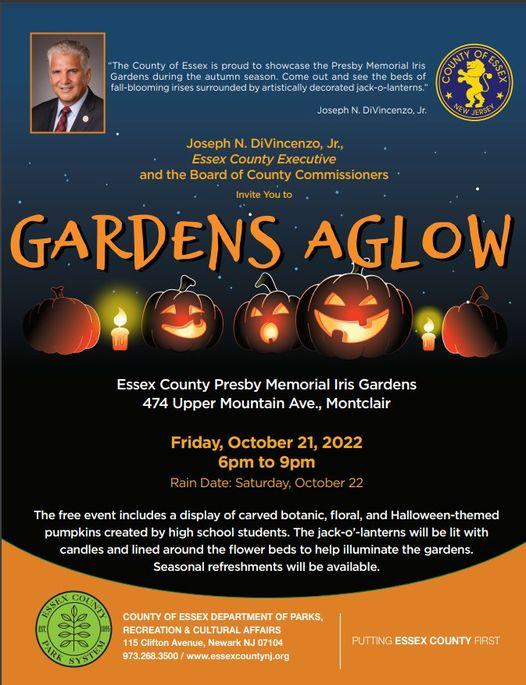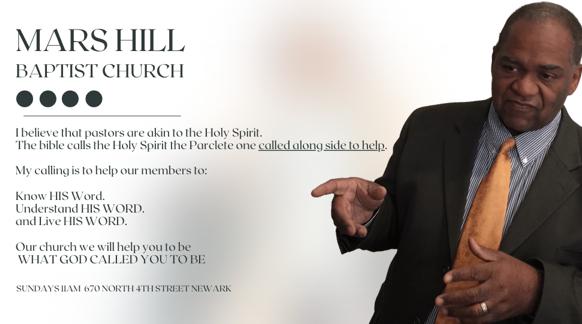



A Publication of The New Jersey Institute of Theology & Metro Christian Media Transformation MAGAZINE September 2022 Dr. James Alfred Jackson, Jr., Th.D
Here at NJITOS, student success is our focus. That's why we have implemented a unique learning model that allows you to be in the driver's seat of your education. We want you to utilize your past knowledge, capitalize on your experience, and follow the best process for your own learning. That's
why we developed a Theological CompetencyBased Fast-Track Education Model. We are currently the only institution offering competency-based theological degrees in the state of New Jersey; A model other seminaries, colleges and universities are increasingly striving to implement.
With 24/7 access to online learning resources to engage with on your schedule, you can embark on a learning journey tailored exactly to your own knowledge—focusing on areas where you need more help and moving quickly through areas you already know or understand. In addition, faculty members are here to provide personalized, one-on-one learning support when needed.

A Publication of The New Jersey Institute of Theology & Metro Christian Media



NJITOS.ORG

CONTENTS TRANSFORM YOU MIND TRANSFORM YOU MINISTRY TRANSFORM YOU HEALTH TRANSFORM YOU FINANCES TRANSFORM YOUR RELATIONSHIPS SHARE YOUR MINISTRY EVENT WITH OUR OVER 3,000 SUBSCRIBERS TOTALLY FREE AS THE LORD PROVIDES. Send you events and articles to: design@NJITOS.orgDr. Rick Greene, President | Publisher


But just Love them anyway!!!
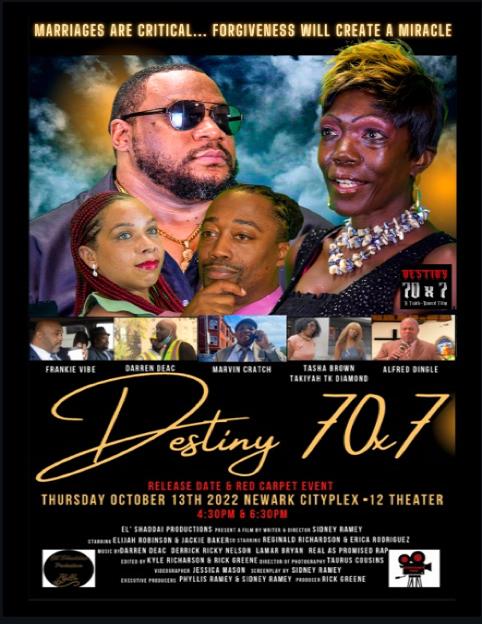

The Rev. Dr. James A. Jackson Jr., Th.D. was born in Harve de Grace Maryland to the late James and Lottie Jackson. Rev. Jackson received his formal education from the Philadelphia High School System. After retiring from the United States Army after 26 years of service, he received his Bachelors in Management from the University of Phoenix and his Master’s in Business Administration from Trident University. He is also a graduate from Liberty University Master’s Program for Pastoral Studies. Dr. Jackson received his doctoral degree from the New Jersey Institute of Theology in 2021; and he recently retired from the Department of Veterans Affairs after a total of 33 years of service to the U.S. Government.
On June 26, 2016, Rev. Jackson was installed as the fifth Pastor of First Baptist Church of Belmar, NJ. Early in his career he held various pastoral positions/titles at Crusaders for Christ Church in Philadelphia, Pa, Second Baptist Church in Long Branch NJ and Calvary Baptist Church in Red Bank, NJ.
Pastor Jackson currently lives in Neptune, New Jersey and is happily married to his wife of 12 years, First Lady Delinda Jackson. Together they have two sons, Kenwyn who is currently serving in the US Army and Joshua who attends Kean University. Pastor James A. Jackson, Jr. has a love for serving God, going to church, quality time with his family and working with the youth; and he truly believes in Joshua 24:15 “…but as for me and my house, we will serve the Lord.”
REV. DR. JAMES A. JACKSON, JR., Th.D. Pastor, First Baptist Church of Belmar, NJ

First Baptist Church is located just 3 blocks from the Atlantic Ocean in the small resort town of Belmar. Established in 1894, First Baptist was the first Black church and the first Baptist church in Belmar. The original church building was erected in 1900 and the current building still stands on that site of 410 Ninth Avenue.
In 2016, Rev. Dr. James A. Jackson, Jr. was installed as the 5th pastor of the 50+ member church. In 2020, First Baptist Church, Belmar celebrated its 120th year anniversary.
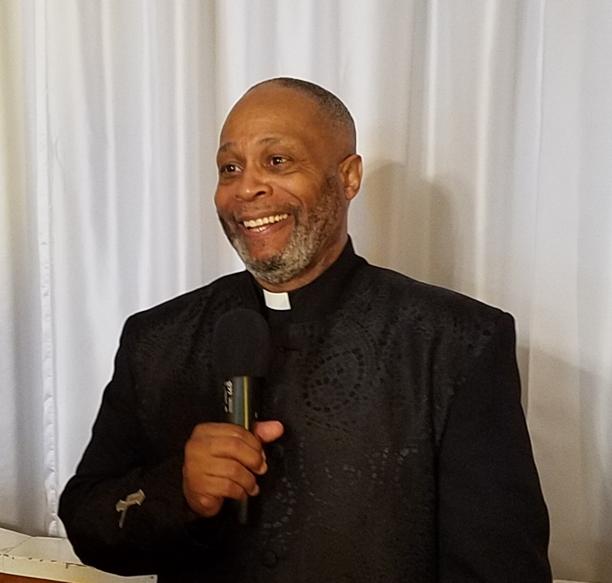


First Lady Delinda and Dr. Jackon

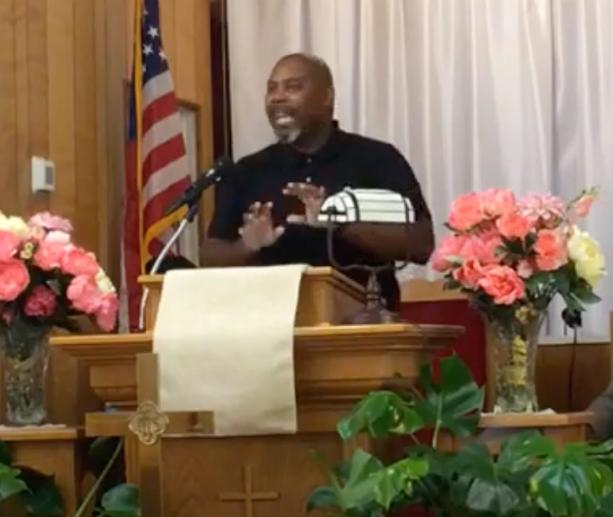
First Baptist Church is located just 3 blocks from the Atlantic Ocean in the small resort town of Belmar. Established in 1894, First Baptist was the first Black church and the first Baptist church in Belmar. The original church building was erected in 1900 and the current building still stands on that site of 410 Ninth Avenue.
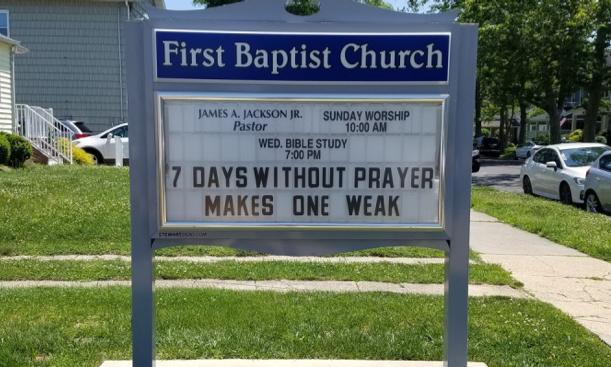
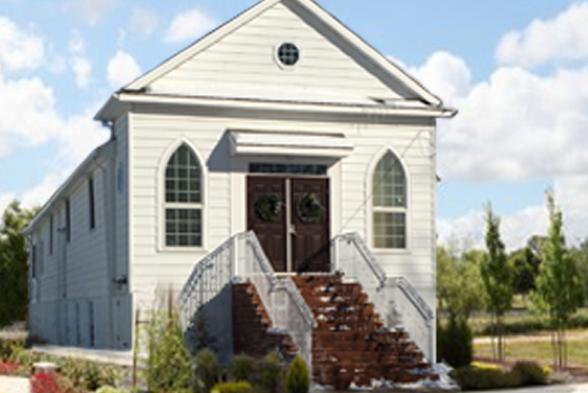
In 2016, Rev. Dr. James A. Jackson, Jr. was installed as the 5th pastor of the 50+ member church. In 2020, First Baptist Church, Belmar celebrated its 120 th year anniversary.

First Baptist Church has a rich history at the beautiful Jersey Shore, located just 3 blocks from the Atlantic Ocean in the small resort town of Belmar, New Jersey. Established in 1894, First Baptist was the first Black church and the first Baptist church in Belmar. The original church building was erected in 1900 and our current building still stands on that site of 410 Ninth Avenue. In 2020, we celebrated our 120th year anniversary and we are excited to continue spreading the good news well into the future.
In 2016 Rev. Dr. James A. Jackson, Jr. was installed as the church’s 5th pastor. Under his tutelage, a number of firsts took place including – the development of a social media presence, licensing its first female minister and ordaining its first female deacon. Pastor Jackson also led the church through the unprecedented beginnings of the terrible COVID-19 pandemic. He kept our congregation spiritually close and made it possible for God’s people to worship together even while the building was closed.
In recent years, new ministries were created including: the Youth Squad and Women’s Ministry. These two ministries especially speak to the important issues of each specific group. We are a small but might church and with God’s help, we will continue to add relevant ministries for our members and more members to God’s Kingdom.
First Baptist Church considers community involvement very important. God’s people can and should effect change where they are. So will continue to develop progressive partnerships with community and church leaders, academia and local health organizations to enhance and improve the lives of our members and the people in our surrounding areas. With our membership in the American Baptist Conference, First Baptist Church will have opportunities to tap into the resources we need to do all of this and more.
Pastor Jackson believes the mission of the church is very simple and is preparing FBC members to fulfill this commission, given to us by Jesus Christ, through life example and service. “Go ye therefore and teach all nations, baptizing them in the name of the Father and of the Son and of the Holy Ghost…” Matt 28:19.
As we continue in our journey with Pastor James A. Jackson, Jr., Th.D. as our leader, First Baptist Church, Belmar, is and has always been a church that evangelizes to the sinners and equips the saints.

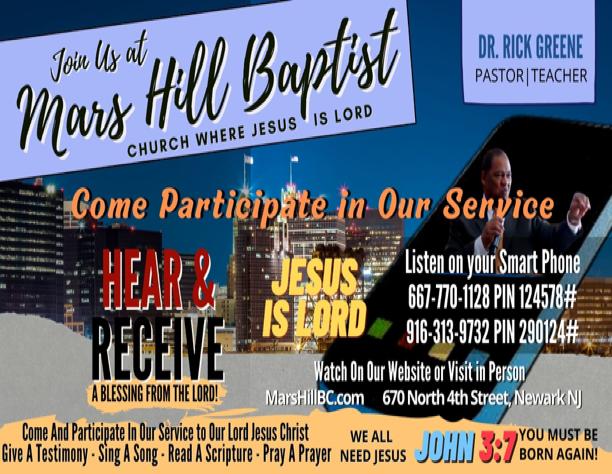

Church Where You Can Use Sundays 11am



Transform Your MIND
Solomon wrote, “Of making many books there is no end, and much study wearies the body” (Ecclesiastes 12:12). Any student who has pulled an allnighter, crammed for a test, memorized an equation, or pored over a textbook can verify the truth of that statement. Solomon’s point was that there are more important things than simply amassing knowledge—namely, fearing God and obeying Him (verses 13-14).
That is not to say that education is unimportant. In fact, Jesus Himself learned. One of the only things we know of His childhood is that He “grew in wisdom” as He grew “in stature” (Luke 2:52). That is, the Son of God voluntarily put Himself in a position where He needed to assimilate knowledge as a man. Education was part of the process.

The church has historically promoted education and the improvement of the mind. The Reformer John Calvin was a strong advocate for universal education, believing that every child should be trained in reading, writing, math, and grammar, as well as religion. Martin Luther taught that education was essential, “both to understand the Word of Scripture and the nature of the world in which the Word would take root.” The modern Sunday school movement began in 1780 when Robert Raikes began educating poor children who were otherwise overlooked by society. Most universities, including Harvard, Yale, Princeton, Oxford, and Cambridge, were founded by Christians as religious schools.
In the book of Proverbs, a son is exhorted to heed his father’s instruction, and the application of the knowledge learned is called wisdom. The word education may not appear in the English form in the Bible, but Scripture does say a lot about the process of education, and it begins with the parent and child. The command to parents is to nurture their children in the Lord (Ephesians 6:4), and the Greek word paideia, translated “nurture” in the KJV, carries with it the idea of training, education, instruction and discipline.

Solomon tells us that the basis of all true knowledge is the fear of the Lord (Proverbs 1:7). The word fear here does not carry the idea of terror or dread; rather, it is awe and reverence for the holiness and majesty of God and a reluctance to disappoint or disobey Him. Jesus said that when we know the truth, the truth will make us free (John 8:32). Freedom from fear comes from being educated in Truth.
In Romans, the apostle Paul uses the word know or knowing eleven times. What are we to know? God’s Word. When we acquire spiritual knowledge and apply it to our lives, we serve the Lord in spirit and truth (Romans 6:11-13). Theology has been called “the queen of the sciences” because our knowledge of God informs every other area of erudition.
The Christian is to “study to shew thyself approved unto God” (2 Timothy 2:15, KJV). The NIV renders this verse, “Do your best to present yourself to God as one approved, a workman who does not need to be ashamed and who correctly handles the word of truth.” The Greek word translated “study” means “to give diligence, to exert oneself, or to make haste to apply oneself.” Therefore, in order to educate ourselves, we must apply ourselves to study with diligence the Word of God.
Some people see education as a cure-all for society’s ills. However, education, in and of itself, does nothing to combat ungodliness. In fact, knowledge, apart from the love of God, leads to pride (1 Corinthians 8:1). Nicodemus was “Israel’s teacher,” yet he did not understand even the basics of spiritual life (John 3:10). Paul was a highly educated man, having been trained in the best Jewish school of his day (Acts 22:3), and he used his education to communicate effectively to people of many cultures (Acts 17:28; Titus 1:12). Yet Paul’s education certainly did not make him holy (1 Timothy 1:16), and he warned of those who were “always learning and never able to come to the knowledge of the truth” (2 Timothy 3:7). Simply knowing facts does not make one a better person, and it is indeed possible to be a highly educated fool.
Education begins with the reality of God’s existence and the fact that He has communicated to us through creation, His Word, and His Son. As we learn more of God’s creation, our understanding of God’s wisdom and power deepens. As we study God’s Word, we become more equipped for God’s work (2 Timothy 3:16-17). As we grow in our knowledge of God’s Son (2 Peter 3:18), our love for Him increases and our service for Him intensifies.


Transform Your MINISTRY


In the most basic sense, all Christians are called to ministry. The Great Commission (Matthew 28:18-20) applies to all believers. Too, every Christian is part of the Body of Christ. Fulfilling one’s role as part of the Body – no matter what that role is – means ministering to others. However, most people who ask this question are really interested in whether they are called to vocational ministry, such as the pastorate. This is an excellent question. Certainly, vocational ministry has unique demands.
In confirming any calling, it is important to first examine your heart and motivation (Jeremiah 17:9). Do you truly feel this call is from God, or is it a personal desire? Or is it an attempt to live up to someone else’s expectation of you? If the motivation is pride or people-pleasing, you should give pause. Are you feeling “called” because you think that in order to be “most Christian” you must work in a distinctly “Christian” ministry? Christians are the fragrance of Christ (2 Corinthians 2:15) no matter where they serve. You can be light and salt and “do ministry” outside the church or in a secular job just as well as you can within the church or in a distinctly Christian vocation.
Guilt can sometimes be mistaken as a call to ministry. Many Christians hear that serving God requires sacrifice, which it does. But this does not mean all Christians are called to a foreign mission field or that the type of ministry you would enjoy least is what God is calling you to do. Yes, living for Christ requires sacrifice, but not misery. There is joy in living out our calling. Paul is a great example of this. He suffered greatly for his ministry, yet he was always content and joyful in Christ (see especially Paul’s letter to the Philippians).
After you are certain that your heart is rightly motivated, consider your natural (and spiritual) gifts and strengths. Do these seem to fit with the vocational ministry you are considering? Yes, God is shown strong in our weaknesses and calls us to serve out of His strength rather than our own. But He also gave us gifts and talents to use for Him. It is unlikely that God would call someone who is manually unskilled to be a repairman. Are you gifted in the area in which you think you are called?
Another important consideration is your natural inclination. Someone invigorated by accounting facts, for example, is likely not going to enjoy a position in pastoral care. You may find spiritual gifts tests and even personality tests to be helpful in determining your natural gifting and inclination.
Another area to consider is your experience. God prepares us before launching us into our calling. For example, in the Bible we see this occur with David’s training under Saul prior to his taking the throne or Moses’ time both in Egypt and in the Midian desert prior to leading the Israelites out of captivity. (Reggie McNeal’s A Work of Heart does an excellent job depicting this time of preparation). Are there things in your past that God will use to contribute to your work in the call?
Also, you’ll want to seek counsel (see Proverbs 11:14 and 15:22). Others can often see strengths and weaknesses in us that we cannot. It is helpful to receive input from trusted, godly friends. It is also helpful to observe others’ reactions to you. Do people seem to naturally follow you, or do you often have to force your leadership? Are people naturally open with you and share their concerns? While it is important to seek counsel, it is also important not to rely solely on this. Sometimes our friends and family are wrong (see 1 Samuel 16:7). However, honest feedback from those who love you should help confirm your calling.
Every person has a unique calling from God. The call to vocational ministry, however, is particularly public, and those in public ministry are often both highly regarded and highly criticized. James 3:1 says, “Not many of you should presume to be teachers, my brothers, because you know that we who teach will be judged more strictly.” Those in ministry leadership positions are held to high standards because they are guiding others. The books of 1 and 2 Timothy and Titus list requirements for those in church leadership positions.
When determining whether or not you are called to vocational ministry, consider what it will entail, be courageous, and trust God. If God has called you, He will equip you and fill you so that you may be poured out for others (see Matthew 6:33; Hebrews 13:20-21; Ephesians 3:20-21; Psalm 37:23; and Isaiah 30:21).
One more thing. It is important to keep moving. We sometimes refuse to move until we are certain of the call. But it is easier to redirect something already in motion than to get something moving. When we step out in faith – even if our step is not quite in the right direction – God is faithful to guide us.
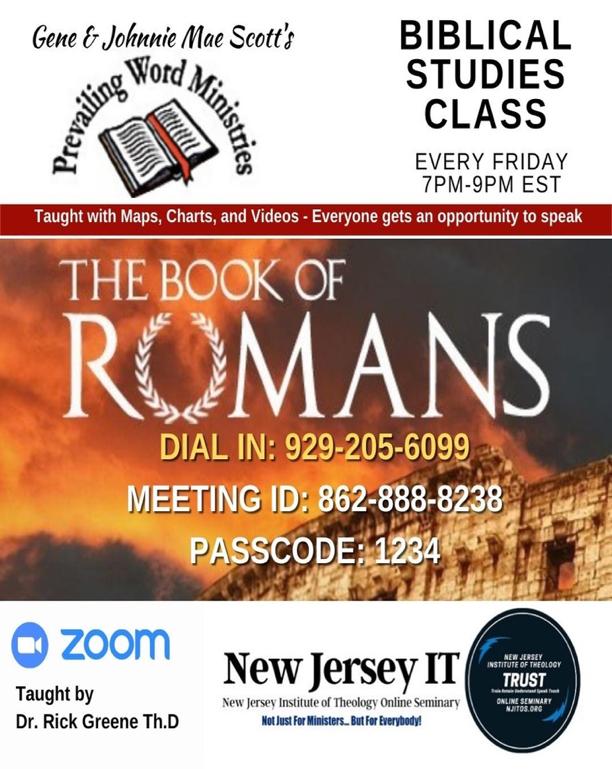






Transform Your HEALTH

Anyone who has experienced burnout knows it is not something he ever wants to experience again. Burnout is commonly described as an exhausted state in which a person loses interest in a particular activity and even in life in general. Burnout is a state of emotional, physical, social, and spiritual exhaustion. It can lead to diminished health, social withdrawal, depression, and a spiritual malaise. Many times, burnout is the result of an extended period of exertion at a particular task (generally with no obvious payoff or end in sight) or the carrying of too many burdens (such as borne by those in the helping professions or those in positions of authority, among others). Burnout can be common among those in high-stress jobs who feel forced to please an earthly master in order to maintain their job and continue to provide for their families. The god of money reigns in Western culture, and his demands often lead to burnout. Christians are not immune to the demands of economic realities or to experiencing fear of failing to meet those demands. Unfortunately, burnout can also be common among those in vocational Christian ministry and those highly involved in their churches. In these cases people sometimes feel compelled to serve the god of productivity and works. Burnout can happen anywhere. It is the result of overwhelming demands or responsibilities, either placed on us by others or by ourselves, that we simply cannot bear. So what does the Bible say about burnout?
Jesus said, "Come to me, all you who are weary and burdened, and I will give you rest. Take my yoke upon you and learn from me, for I am gentle and humble in heart, and you will find rest for your souls. For my yoke is easy and my burden is light" (Matthew 11:28–30). The ultimate solution for those currently experiencing burnout is to find refreshment in Christ. For those with a particularly high level of burnout, this refreshment may include obtaining medical support and drastically altering their life activities. Others may find refreshment through seeing a counselor. Reading encouraging Scriptures (such as Romans 8, John 15, or Psalm 139) can be very life-giving. Even simple activities like cooking, going for a walk, playing with the kids, or watching a funny show can be restorative.

The prevention plan for burnout is to rest in Jesus and follow His direction for life.
Burnout is often the result of self-reliance. The self-reliant take upon themselves the role of savior rather than trusting God to accomplish His own will. They begin to see every need as their call, rather than asking for God’s wisdom and direction. This can play out in a ministry setting when a pastor attempts to do the work of the entire Body of Christ, in a business setting when someone forces a certain plan or project, in a family setting when a parent takes responsibility for the success and happiness of a child, and in numerous other settings.
Another cause of burnout is a lack of self-care. Those who do not take care of themselves fail to understand how much God values them. They fail to accept His rest and His love for them, instead martyring themselves on the altar of pleasing others. They may sacrifice sleep, nourish their bodies poorly, overextend their schedules, or neglect their needs in other ways. Whether it’s a lack of self-care or an insistence on self-reliance, burnout stems from a lack of understanding of the character of God and His expectations for our lives.
Work is part of the human calling (Genesis 1:28; 2:15; Colossians 3:23; 2 Thessalonians 3:10). Generativity is a portion of what gives our lives a sense of meaning and purpose. Christians are also expected to be self-sacrificial, at times giving beyond themselves. However, nowhere in the Bible does God equate our acceptability or our identity with our work. And nowhere does God command or condone working so hard that we become burned out. Rather, our work is to be energized by Him. He demonstrated the importance of rest on the seventh day of creation and with the Sabbath command (Genesis 2:2-3; Exodus 20:8-11; Mark 2:27). After one particularly busy time, Jesus invited His disciples away from the crowds for a time of rest (Mark 6:31). Jesus said to come to Him with our burdens and take His yoke instead. He also gave us the Holy Spirit who can give us discernment in what tasks to say "yes" to.
Moses would have burned out, but for the wise counsel of his father-in-law, Jethro. The story is found in Exodus 18:14-23. Moses thought he was doing the will of God by sitting as judge and hearing the people’s cases. However, Jethro rightly recognized that this was not a job for one man to handle alone. Eventually, Moses would burn out, and the people would be left unsatisfied. To



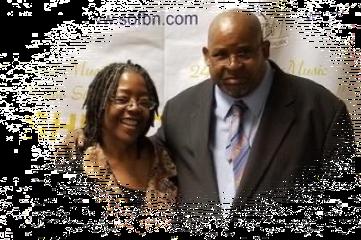

SOFBN.COM

We Just May Be… The Place For You All Degree Progams only $400! Acredited by the National Bible College Association The New Jersey Institute of Theology NJITOS.ORG
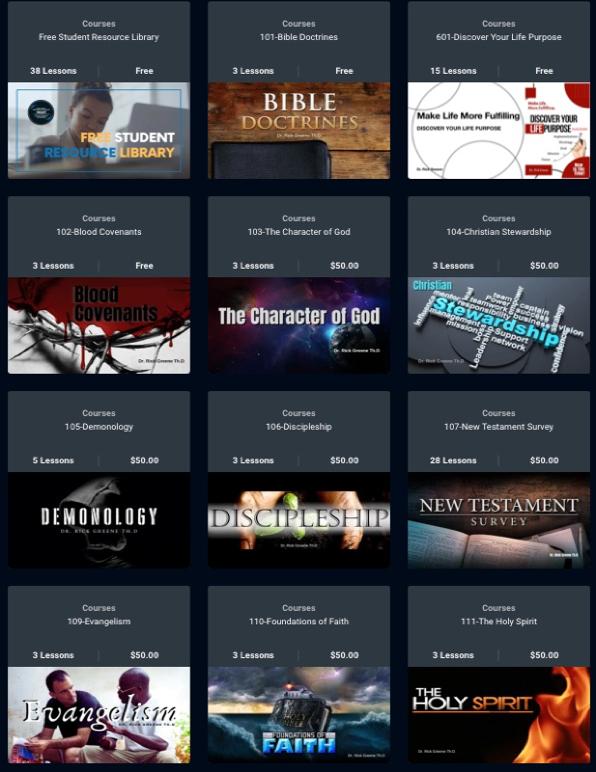
Some of Our Featured Courses
Transform Your FINANCES

The Bible does not specifically mention saving for retirement, per se, and it doesn’t mention 401(k) plans, IRAs, or the like. However, the Bible does speak of saving money, and it gives us clear principles to guide us in whether Christians should save for retirement.
The issues of retirement and investment in stocks will be addressed in other articles. This article will focus primarily on the issue of whether Christians should save money for perceived future needs, such as when no longer generating income.

The Bible speaks positively about providing for oneself financially through work. In 2 Thessalonians 3, Paul gives a warning against idleness. He reminds the Thessalonians of how he and his companions worked to provide for themselves while serving the church, despite the fact that they had a right to receive monetary support from the church. In verse 10 Paul says the rule is that “the one who is unwilling to work shall not eat.” It seems, then, that we are responsible to provide financially for ourselves when possible. The question becomes whether we should save money during our working years in order to provide for ourselves during our retirement years, when we are unable to generate income.
The book of Proverbs has many admonitions that promote saving money and other resources. Proverbs 21:20 says, “The wise store up choice food and olive oil, but fools gulp theirs down.” Proverbs 6:6–8 uses an insect as an illustration of the need to save: “Go to the ant, you sluggard; consider its ways and be wise! It has no commander, no overseer or ruler, yet it stores its provisions in summer and gathers its food at harvest.”
Recognizing a future need and making provisions for it today is a biblically wise thing to do. Financial stewardship now, including saving for retirement, can

enable us to better serve others later. We see Joseph exemplify the wisdom of saving in Genesis 41 when he stored provisions for the prophesied famine to come. We could even say that God’s command to the Israelites to gather enough manna on the sixth day to provide for both Friday and Saturday is a form of saving for a future need (see Exodus 16). Of course, “some of the people went out on the seventh day to gather it, but they found none” (verse 27). In their failure to plan ahead and save, they went hungry.
On the other side, we have passages like Matthew 6:25–34 in which Jesus encourages us not to be worried for tomorrow or to seek after the things of the world. Later, Jesus tells the parable of the rich fool, who had such an abundance of crops that he planned to build a larger barn to store up provisions for himself so that he could “say to [himself], ‘You have plenty of grain laid up for many years. Take life easy; eat, drink and be merry’” (Luke 12:19). “But God said to him, ‘You fool! This very night your life will be demanded from you. Then who will get what you have prepared for yourself?’” (verse 20). Jesus concludes with this application: “This is how it will be with whoever stores up things for themselves but is not rich toward God” (verse 21). The issue in both passages seems to be one of heart. Jesus is not speaking against saving now for needs in the future. What He is talking about is where our hearts should be focused. We are to value the things that God values, trust in His provision instead of our own wealth, and also live wisely.
Christians are wise to examine their current spending patterns and their perceived future financial needs. When considering how to save for retirement, it is good to pray over the matter, search the Scriptures on the appropriate use of money, and meet with a financial adviser. Saving is wise, and trusting God is wise. As we save for retirement, we recognize that the goal is not a selfish enjoyment of a lavish life after years of work. The goal is not even selfsufficiency, since our dependence is always on God. The goal is to exercise godly wisdom in providing for our needs in future years and having enough to continue giving to others. Our trust is not in government programs or 401(k)s or individual retirement accounts. Our hearts are set on things above, where our true treasure is. Ultimately, our money belongs to God and is directed for His purposes.


New Jersey Institute of Theology Online Seminary (NJITOS) is an independent religious institution founded by Dr. Rick Greene Th.D in November 2018 in Montclair New Jersey, United States. The Seminary, which provides theological education through correspondence and without any campus classes, grew out of the biblical studies classes taught by Dr. Greene on the campus of Seton Hall University in South Orange New Jersey and in partnership with Prevailing Word Ministries.

NJITOS operates online worldwide to offer religious study programs with a focus on pastors, ministry leaders, teachers and serious bible students seeking a deeper understanding of God and His word through a systematic plan of study leading to a religious degree.
The Seminary features work at your own pace training, which can result in completed programs of study within months instead of years. The school's FAST-TRACK degree programs offer an alternative to those who enter into ministry without any formal training and are tempted to apply to diploma mills for credentialing with little or no study. NJITOS offers many free courses and offers scholarships on a cases by cases basis. The full tuition at the school is affordable to all, and often less than the cost of a single course at many universities.

NJITOS.org


Transform Your RELATIONSHIPS
Marriage has been a hot topic lately, and there is much confusion surrounding the issue. Is there a design for marriage, and, if so, who has the right to change the design? Can we redefine what marriage is if the old definitions are too restrictive? At the heart of our questioning is a clash of worldviews.
It seems that Christians who take the Bible as God’s final word on the subject of marriage are the only ones who are not confused. God is not the author of confusion (1 Corinthians 14:33), and He has stated plainly that marriage is His idea. He defined it in the Garden of Eden (Genesis 2:24). Jesus reiterated God’s design for marriage in the New Testament (Mark 10:6–8).
After God created the first man, Adam, He said, “It is not good for man to be alone. I will make a suitable helper for him” (Genesis 2:18). So God’s first objective in creating marriage was to provide companionship. He did not make another man for Adam so that he could experience brotherly affection. He created a woman from the man’s own body and brought her to the man (Genesis 2:21–22). With the woman, Adam could experience a deeper kind of intimacy than he could with a man. God created male and female bodies and souls to complement each other in such a way that they become “one flesh” in marriage (Genesis 2:24).
God’s design for marriage is that it be a unique union between a man


and a woman in a covenant for life. God’s design includes sex, the consummation of that union, which is to be experienced only between a married couple. Any sexual expression outside the marriage covenant is sin. The sexual union was designed, in part, to bring forth children (Genesis 1:28), who are to be raised in “the nurture and admonition of the Lord” (Ephesians 6:4). By designating specific roles for husband, wife, and children, God instituted the family. With the husband bearing the responsibility for the family’s well-being and the wife acting as his helper, the family can thrive (Ephesians 5:21–33).
God’s design for marriage is that it be a picture of His union with those He calls His own. Throughout the Old Testament, God used imagery related to marriage to explain His love and commitment toward Israel. When the nation of Israel rebelled against Him, God expressed the sorrow and jealousy of a man who has a cheating wife. “Like a woman unfaithful to her husband, so you, Israel, have been unfaithful to me,” the Lord says in Jeremiah 3:20. In the New Testament, marriage is used as an illustration of Christ and His relationship with His Bride, the Church. Paul writes, “I am jealous for you with a godly jealousy. I promised you to one husband, to Christ, so that I might present you as a pure virgin to him” (2 Corinthians 11:2; cf. Ephesians 5:31–32). So God’s design for marriage is that it be an unbreakable covenant such as God has made with His people.
When God designed marriage, He pronounced it “very good” (Genesis 1:31). He still pronounces it “good” when we follow His design. All perversions of His design, including divorce, sexual promiscuity, and homosexual activity, destroy families and therefore weaken society. God is the designer of marriage and the only One qualified to give us instructions about how to use His gift. We do well when we decide to follow His design for marriage.

